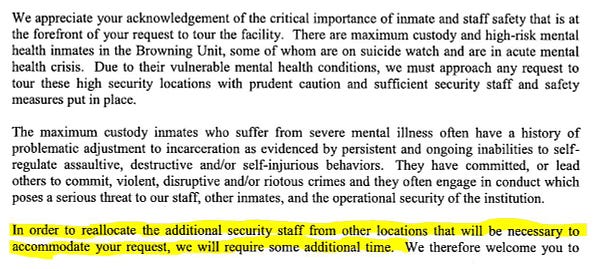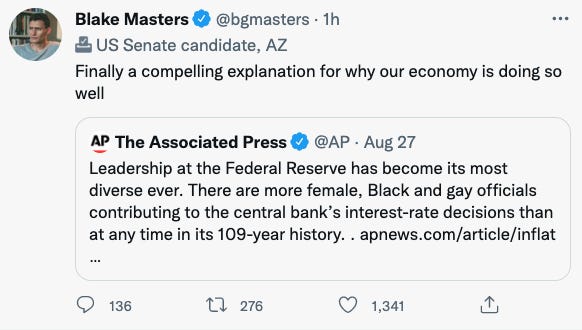The Daily Agenda: Slightly better doesn't mean good
If only there were people who could do something about housing ... Bring the reporter, too ... And it's quite a work of art.
Home prices in Phoenix are finally slowing down after wild jumps in the past two years. That should also help people looking to rent. But it’s going to take massive political will and big ideas to resolve the long-simmering housing crisis in Arizona.
The market to buy a house is now reaching a point of “balance,” where prospective buyers don’t need a mountain of cash or to waive important things like inspections to get an offer accepted, the Republic’s longtime housing expert Catherine Reagor notes. It’s undoubtedly better for buyers than a few months ago, and still appears unlikely that the market will experience a full-blown crash because the conditions are much different than 2008, she writes.
But housing prices, both buying and renting, remain out of reach for many Arizonans. Our housing supply doesn’t yet meet the demand of new people moving here. Our wages have not kept up with housing costs.
The most visual representation of our housing crisis sits just beyond the doors of some of the people who could actually do something about it, at the growing encampment near the state Capitol. The inaction on homelessness led to a lawsuit against Phoenix from nearby businesses. And in the meantime, people living outside at this time of year fight to stay alive, confronting extreme heat.


Available shelter spaces are pretty much always full. There’s money from the federal government’s COVID-19 relief funds, but the City of Phoenix still hasn’t spent most of it, 12News reports. Residents are calling the city more frequently these days to complain about encampments at public parks.
Another part of the housing crisis stems from the rampant short-term rentals that sprung up in Arizona, particularly in touristy areas like Scottsdale and Sedona. The state actively hindered cities’ abilities to regulate short-term rentals in 2016, making these parts of the state overrun with Airbnbs instead of local renters.
This year, lawmakers finally walked back some of those pro-Airbnb laws. With bipartisan support, they approved a law that will allow cities — which have been begging for years for ways to reel in these kinds of rentals — to put in some regulations. Cities will be able to require licenses for short-term rentals and suspend those licenses, plus institute fines for violations of laws or ordinances.
That law will go into effect on Sept. 24, the general effective date for laws passed this legislative session. And cities and towns are already readying themselves to make use of it. Scottsdale spokesman Kelly Corsette told us the city is preparing a draft ordinance for the city council to consider that will take advantage of the local license and permit provisions in the new state law. Even outside the new state law, cities are getting creative: Sedona, for instance, is offering short-term rental owners up to $10,000 if they rent to long-term locals instead.
But beyond the short-term rental changes, the state has done little to address the growing housing problem. Last session, they greenlit a study committee to look into housing supply issues, which will present a report on its findings at the end of the year. Usually, study committees are where good ideas go to die. Occasionally, these committees’ work becomes the basis for decent laws. We’re pulling for the latter.
Finchem is 0 for 2 this week: Republican secretary of state nominee Mark Finchem, U.S. Rep. Paul Gosar and former and likely future state Sen. Anthony Kern will have to pay more than $75,000 in attorneys fees for bringing a bogus lawsuit against former House Democratic Leader Charlene Fernandez, a Yuma County Superior Court judge ruled yesterday. Finchem and crew had sued Fernandez last year for requesting the FBI investigate him over his role in the Jan. 6 riots, but the court ruled that request was “clearly protected” by the First Amendment and that the lawsuit against her was written for political purposes and was “groundless and not in good faith.”
Lawmakers yes, reporter no: A trio of Democratic lawmakers demanded a tour of Arizona prisons after the Republic’s Jimmy Jenkins last week brought to light whistleblower complaints that understaffing is creating a dangerous atmosphere for both inmates and guards. Department of Corrections Director David Shinn agreed to give the lawmakers a tour later this week, but denied their request to bring Jenkins along, he reports.


It’s not a light switch: After the dust settled on recent abortion lawsuits, Planned Parenthood announced it is resuming surgical and medical abortions, but only at one clinic in Tucson for now, since that was the only place where providers felt comfortable starting back up, KJZZ’s Alisa Reznick reports.
Who could have predicted?: Republican Sen. Vince Leach probably won’t be on the November ballot after he lost the primary election and also his case in Pima County Superior Court yesterday arguing that his Republican opponent Justine Wadsack doesn’t live in the district. In what can modestly be described as a pretty wild day in court, attorneys seeking to disqualify her made a compelling case that she didn’t actually live in a room in a supporters house that she rented for $250. But it wasn’t enough to overcome the burden of “clear and convincing” evidence. Leach’s backers could still appeal.

Watch the wheel turn itself: Waymo is officially shuttling a select group of people around downtown Phoenix in its driverless cars, and Mayor Kate Gallego cut a promotional video for the company after taking a ride, saying the driverless cars will make for a more inclusive city for those who can’t drive. Gallego herself didn’t drive for a year after a 2013 seizure, the Republic’s Taylor Seely reports.
It’s a dry hate: Fernanda Santos, the author and former New York Times Phoenix bureau chief, writes in her column for the Washington Post how her family decided to leave Arizona for New York after her child began identifying as non-binary.
“In a group chat after sleepaway camp in the idyllic mountains of Central Arizona, fellow campers ganged up on my child, telling them that anyone who is nonbinary would go to hell,” Santos writes.
Plants need water: ProPublica has a thoroughly depressing Q&A with Jay Famiglietti, the executive director of the Global Institute for Water Security at the University of Saskatchewan, about the fact that once water dries up, western farmers won’t be able to grow food.
Paying for your subscription is like watering this newsletter — it helps the Agenda survive and grow. If you’re seeing this note, it’s because you haven’t paid for your subscription. Make it rain by clicking below.
Pivot to November: You can add “the 2020 election was a rotten mess” to the list of hot takes that U.S. Senate Republican nominee Blake Masters has removed from his website after winning the GOP primary election, CNN reports.
No gun, no badge, no vest: The family of murdered Pima County Constable Deborah Martinez-Garibay says they believe the shooter’s mother had called for a wellness check on him before the shooting due to his concerning behavior, Nicole Ludden reports in the Daily Star. And her family notes that even though she was appointed to the job six months ago, she still didn’t have a county-issued firearm, bulletproof vest or badge, and she was instead taking her own gun out while serving eviction notices.
We’re still in 2020: If there’s one theme uniting Arizona Democratic candidates, it’s calling their opponents Trump-loving extremists, Nick Phillips writes in the Arizona Capitol Times. Even Democratic Sen. Martín Quezada is using the line in his campaign against Republican state Treasurer Kimberly Yee.
Welcome to Arizona: Rural schools like Stanfield Elementary, located north of Interstate 8 in western Arizona, are increasingly turning to foreign workers on visas to teach children amid the teacher shortage, ABC15’s Courtney Homes reports. But some of those teachers from abroad are pretty shocked at the lack of resources in Arizona’s education system.
"I thought the classes would've been well-equipped. Because I believe this country has the potential to equip all of the classrooms,” Stephonie Martin, a teacher originally from Jamaica, said.
That sounds like her: Democratic U.S. Sen. Kyrsten Sinema quietly tanked President Joe Biden’s planned nomination of Ganesh Sitaraman for an obscure yet powerful regulatory agency that could be crucial to bolstering his agenda, The Intercept writes, citing anonymous sources.


Debating the debate dates: The Arizona Citizens Clean Elections Commission has decided to move its gubernatorial debate — which is currently still a debate, despite Democratic gubernatorial candidate Katie Hobbs’ protestations — because the previous date conflicted with Yom Kippur. The new date is October 12, the commission announced in a press release. And it set a hard deadline of this Friday for candidates to RSVP.
The down-ballot races always matter: There won’t be an election for the Palominas Fire District board in Cochise County because three candidates are running for three open seats, which means a former LDS bishop who’s being sued for failing to report child sexual abuse by a church member will take a seat on the board, the Herald/Review’s Lyda Longa reports.
Our final congressional district is the most competitive of them all: Congressional District 6, which spans from the U.S.-Mexico border in southeastern Arizona through Tucson up to Eloy and Casa Grande.
This district takes a lot of former CD2, another competitive district which both Republicans and Democrats represented over the past decade. But it also includes Republican areas of former CD1, giving it a slight Republican advantage on paper. It’s the only congressional district without an incumbent, after Democrat Ann Kirkpatrick chose to retire.
Former state lawmaker Kirsten Engel, the Democrat, will face off against Republican Juan Ciscomani in what will be one of the most closely watched congressional races in the country.
Engel is an environmental attorney who spent five years at the state Legislature before resigning last year to focus on her campaign. She currently teaches at the University of Arizona.
Ciscomani, a former senior adviser to Gov. Doug Ducey, is a first-generation American and father of six who worked for Ducey for seven years and serves as the vice chair of the Arizona-Mexico Commission. He ran unsuccessfully for the Legislature back in 2008 from a Democratic district in Tucson.
Just another normal tweet from Republican U.S. Rep. Andy Biggs.











"Attack AirBnB" doesn't seem like a productive housing policy. We need to reduce onerous zoning!
Has anyone else noticed that 538's models for the competitive AZ Congressional races are completely off base? They list AZ-2 and AZ-4 as more competitive than AZ-1 or AZ-6.